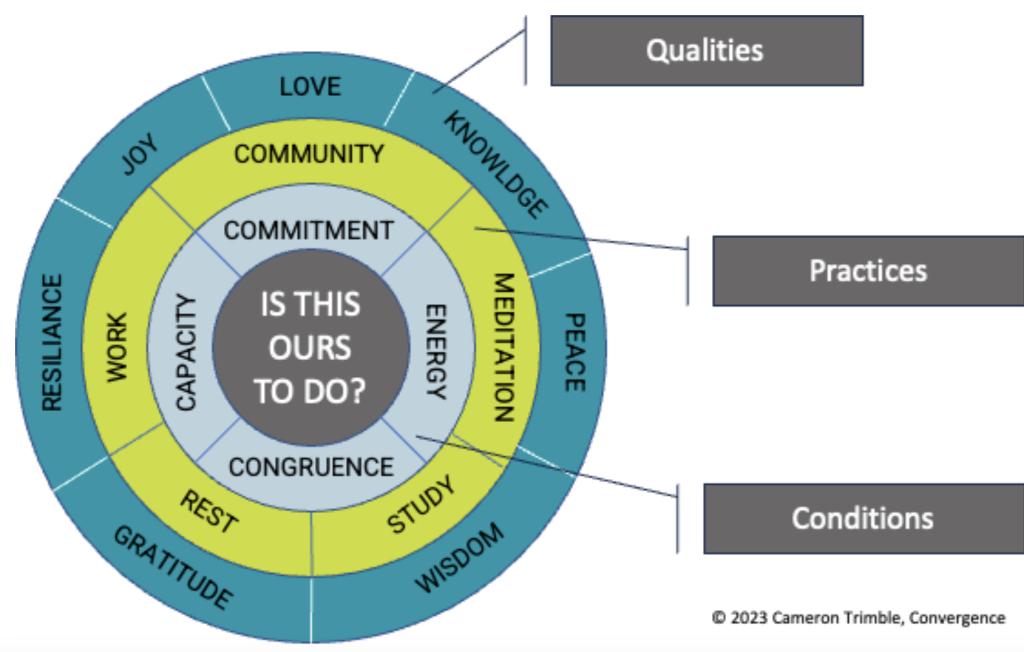My grandfather, Rev. Dr. James McCormick, is a retired minister in the United Methodist Church. He spent a lifetime serving congregations as a pastor and as denominational staff. I was the beneficiary of his deep commitment to the Church and his theological curiosity about God. He gifted me an understanding of God that was grounded enough to give me an orientation to Christian thought but also flexible enough for me to become endlessly curious about how God is still speaking today.
He and I would spend hours together in his living room, talking about the great questions of life. He was patient with me, helping me step by step piece together a sense of my own beliefs. More importantly, he taught me to trust my intuition while also being disciplined in my study.
Over time I realized that while he had many wise observations to offer, two came up over and over again. In teaching me to see and sense that “still small voice,” he would say, “If it looks, acts, talks, and walks like Jesus, then it’s of God.” For him, Jesus was the clearest example we have of God-incarnate. That said, he didn’t mean this in an exclusive way. He would also say that throughout history, we have seen people who so beautifully embody the spirit of Love that we sense in our own selves the presence of God within them. Being in their presence inspires us to embody those same qualities – loving kindness, deep compassion, and true empathy.
The second lesson that my grandfather would repeat was this: “The quality of your life depends upon the quality of your relationships.” When we fill our lives with kind, generous, loving people, then we develop kindness, generosity, and love within ourselves. If we surround ourselves with angry, manipulative, untrustworthy people, then we also risk-taking on those characteristics.
I think about his wisdom often when consulting with congregations. Properly understood, congregations at their best are “schools of love,” places where we can be with others who make us more compassionate, generous, peace-filled, and kind. They are also places where we practice fairness, justice, and being beloved community. Over time, if we are deepening in Spirit, we begin to look, act, walk, and talk more like Jesus. By this, I mean we are coming to understand essential perennial wisdom rooted in a sense of Oneness with all that exists.
Most of the congregations we work with in consulting and coaching are exhausted. Their leaders and volunteers are torn between wanting to “keep the church going” and being so burned out by the effort that they commonly burst into embarrassed tears in interviews with me. They tell me of all of the meetings they have to attend and all of the time they invest. But they confess a sense of desperation. They are so busy “doing” they are neglecting their “being.” “Besides,” they whisper, “even with all of this effort, we still can’t get families with young children to come. So what is the point?”
What if we have made all of this congregational business too complicated? In congregations where I have served as pastor, we create a discernment compass that helped us make decisions that balanced our being with our doing.

We start on the inside with these questions:
- Do we have the organizational capacity to take on this ministry/project/initiative?
- Do we have enough commitment from our leaders and participants to sustain the work?
- Do we have enough energy in our congregation to dedicate it to this opportunity?
- Is this opportunity congruent with our vision, mission, and values?
Then we would move to the second level of discernment questions. These are designed to remind us that how we spend our days is how we spend our lives. Christian tradition teaches that balanced days include time for meditation, study, rest, work, and community/play. Each opportunity we said “yes” to had to nurture at least three of these practices. In that spirit, we would ask:
- Does this opportunity strengthen our sense of community and connection?
- Does this opportunity invite us into a space of prayer and meditation?
- Does this opportunity deepen our study and learning?
- Does this opportunity allow for rest and rejuvenation at needed intervals?
- Does this opportunity further the work of justice and compassion in our community?
Finally, we would move to the outer circle of discernment questions. Recognizing that everything we do should be in service to our spiritual maturation, we asked:
- Will this experience make us more loving?
- Will this experience gift us with new ways of knowing and understanding God and ourselves?
- Will this experience develop within us a greater sense of peace?
- Will this experience grant us wisdom for the benefit of the world?
- Will this experience deepen our sense of gratitude for God, Creation and one another?
- Will this experience strengthen our resilience for the life of faith and the work of justice?
- Will this experience fill us with a sense of joy and aliveness?
You can imagine that a great deal that we do in our congregations might not pass the discernment compass test. I leave this now to your discernment if this helps you make decisions about how you invest your time together. In the end, our only “yes” should be in service to love for God, your neighbors, and yourself.



Comments
Thank you! I know this was written with churches in mind, As the leader of aprivate non-profit with faith based origins, I find this model wonderfully useful to apply to strategic decisions-making within our community based non-profit. Many times, business consultants fail to get the spirit of an organization and what it needs to thrive and be “successful”. It isn’t all about metrics. Sometimes impact is reflected more accurately by feedback from staff and participants about their health and well-being. Especially in thispost COVID world we live in.
great message, Cameron! And great work you are doing! thank you! Power of the Spirit to you!
This is really helpful as my congregation and I work together on a Ministry “Re-boot” in this “end of pandemic” time.